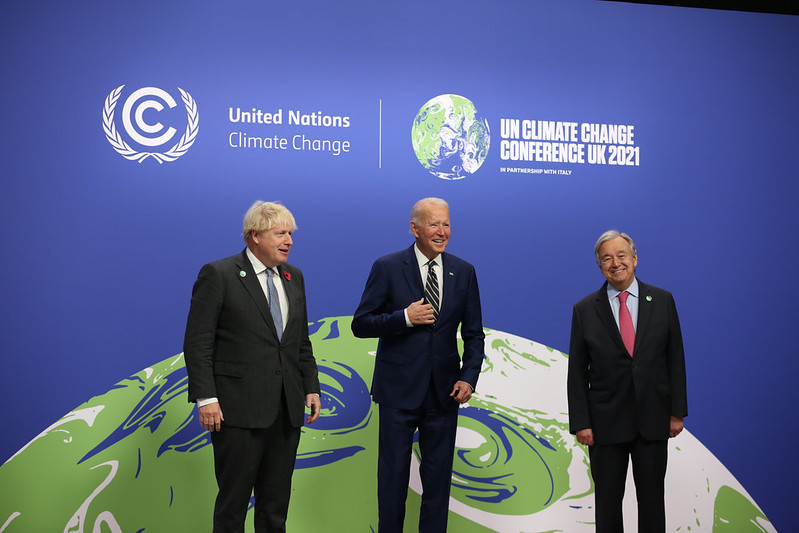
By Anders Lorenzen
World leaders on Monday last week hailed a major breakthrough when, on the first official day of COP26, a deal was agreed to stop deforestation by 2030.
The UK government has lauded the Glasgow Leaders Declaration on Forest and land use as the biggest step forward in protecting the world’s forests in a generation with more than 100 world leaders committed to halting forest loss as well as land degradation by 2030.
While it is only a pledge, the declaration is backed by almost £14 billion in both public and private funding. The countries endorsing it include forest-rich countries such as Canada, Russia, Brazil, Colombia, Indonesia, Democratic Republic of Congo which combined contain 85% of the world’s forests.
The finance, a pledge of £8.75bn of public finance from 12 countries including the UK between 2021 – 2025, will support activities in developing countries, including restoring degraded land, tackling wildfires and supporting the rights of indigenous communities. It will complement £5.3 billion of newly-mobilised private sector funding. CEOs from more than 30 financial institutions with over $8.7 trillion of global assets – including Aviva, Schroders and Axa – will also commit to eliminating investment in activities linked to deforestation.
The UK government has however come in for some criticism for not yet making it a condition in trade agreements with for instance Brazil, the world’s largest deforester.
Enabling deforestation
Global environmental campaign organisation Greenpeace was not impressed by the commitment, their Brazilian executive director Carolina Pasquali saying: “There’s a very good reason Bolsonaro felt comfortable signing on to this new deal. It allows another decade of forest destruction and isn’t binding. Meanwhile, the Amazon is already on the brink and can’t survive years more deforestation. Indigenous Peoples are calling for 80% of the Amazon to be protected by 2025, and they’re right, that’s what’s needed. The climate and the natural world can’t afford this deal.”
Some advocates have welcomed it though and argue we can’t deal with the climate crisis without halting deforestation. The world is currently losing forests at an alarming rate; each minute an area of forest the size of 27 football pitches is lost.
Cathedrals of nature
UK Prime Minister Boris Johnson was delighted with the agreement saying: “These great teeming ecosystems – these cathedrals of nature – are the lungs of our planet. Forests support communities, livelihoods and food supply, and absorb the carbon we pump into the atmosphere. They are essential to our very survival.”
President of Colombia Iván Duque added: “Colombia is proud to endorse the Declaration. It is a landmark commitment from countries to work together to end deforestation and all land degradation within the next decade. Colombia is committed to playing its part. We will enshrine in law a commitment to net-zero deforestation by 2030 – one of the most ambitious commitments in Latin America – and to protecting 30% of our land and ocean resources by 2030.”
The UK says they will commit £1.5bn over five years to support the forests pledge, including £350m for tropical forests in Indonesia, and £200m for the LEAF Coalition. The UK will also contribute £200m, alongside 11 other donors, as part of a new £1.1 billion fund to protect the Congo Basin, the home to the second-largest tropical rainforest in the world which is threatened by industrial logging, mining and agriculture.
It was also announced that governments representing 75% of global trade in key commodities that can threaten forests – such as palm oil, cocoa and soya – will also sign up to a new Forests, Agriculture and Commodity Trade (FACT) Statement. The 28 governments are committing to a common set of actions to deliver sustainable trade and reduce pressure on forests, including support for smallholder farmers and improving the transparency of supply chains.
At the moment almost a quarter (23%) of global emissions come from land-use activity, such as logging, deforestation and farming. Protecting forests and ending damaging land use is one of the most important things the world can do to limit catastrophic global warming, while also protecting the lives and futures of the 1.6 billion people worldwide – nearly 25% of the world’s population – who rely on forests for their livelihoods.
Since Bolsonaro took office he has shown little interest in stopping deforestation; he argues that the forests are Brazil’s resource to do with as they please and sees them as an economic opportunity for the country.
Reblogged this on Some View on the World and commented:
For decades, the world has turned its head away from seeing how nature has been violated in various places in the world and how entire forests have simply been felled for profit from the wood and the landscape further impoverished by monocultures.
Stopping deforestation is one of those urgent measures we have to take to stop the loss of the neighbourhood and give the world back its green lungs.
LikeLiked by 1 person